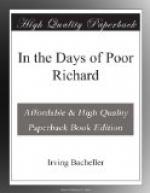“On the wish of our host, Franklin had taken with him a part of his electrical apparatus, with which he amused a large company of the friends of the great Seigneur in his palace grounds. Spirits were fired by a spark sent from one pond to another with no conductor but the water of a stream. The fowls for dinner were slain by electrical shocks and cooked over a fire kindled by a current from an electrical bottle. At the table the success of America was toasted in electrified bumpers with an accompaniment of guns fired by an electrical battery.
“A poet had written a Chanson a Boire to Franklin, which was read and merrily applauded at the dinner—one stanza of which ran as follows:
“’Tout, en fondant un empire,
Vous le voyez boire et rire
Le verre en main
Chantons notre Benjamin.’
“To illustrate the honest candor with which often he speaks, even in the presence of Frenchmen who are near the throne, I quote a few words from his brief address to the Prince and his friends;
“’A good part of my life I have worked with my hands. If Your Grace will allow me to say so, I wish to see in France a deeper regard for the man who works with his hands—the man who supplies food. He really furnishes the standard of all value. The value of everything depends on the labor given to the making of it. If the labor in producing a bushel of wheat is the same as that consumed in the production of an ounce of silver, their value is the same.
“’The food maker also supplies a country with its population. By 1900 he will have given to America a hundred million people and a power and prosperity beyond our reckoning. Frugality and Industry are the most fruitful of parents, especially where they are respected. When luxury and the cost of living have increased, people have become more cautious about marriage and populations have begun to dwindle.’
“The Bourbon Prince, a serious-minded man, felt the truth of all this and was at pains to come to my venerable friend and heartily express his appreciation.
“’We know that we are in a bad way, but we know not how to get out of it,’ he said.
“The Princess, who sat near us at table, asked the Doctor for information about the American woman.
“’"She riseth while it is yet night and giveth meat to her household, and a portion to her maidens,"’ he quoted. ’She is apt to be more industrious than her husband. She works all day and often a part of the night. She is weaver, knitter, spinner, tailor, cook, washerwoman, teacher, doctor, nurse. While she is awake her hands are never idle, and their most important work is that of slowly building up the manhood of America. Ours is to be largely a mother-made land.’
“‘Mon Dieu! I should think she would be cross with so much to do,’ said the Princess.
“‘Often she is a little cross,’ Franklin answered. ’My friend, James Otis of Massachusetts, complained of the fish one day at dinner when there was company at the table. Mrs. Otis frankly expressed her opinion of his bad manners. He was temperamental and himself a bit overworked. He made no answer, but in the grace which followed the meal he said:




